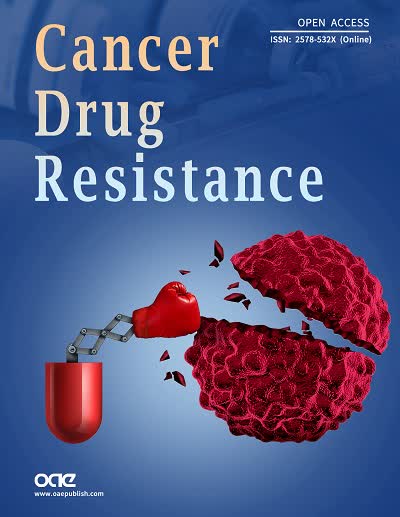The emerging role of GLP-1 receptor agonists in treating or preventing cancer
Abstract
With the growing incidence of obesity-related malignancies, glucagon-like peptide-1 (GLP-1) receptor agonists represent an intriguing potential clinical avenue for cancer prevention and treatment. Population-based data suggest that individuals who have taken GLP-1 receptor agonists have a decreased incidence of obesity-related cancers. Moreover, in vivo and in vitro studies have demonstrated the antitumor activity of these agents independent of other antineoplastic therapeutics. Additionally, other pre-clinical studies have shown that GLP-1 receptor agonists may help overcome resistance to chemotherapy-refractory cancer cells, thus demonstrating a plausible role in cancer treatment. Randomized controlled trials utilizing GLP-1 receptor agonists in both cancer prevention and treatment may allow for a better understanding of the role of these agents in modern oncology.
Keywords
Glucagon-like peptide-1 (GLP-1) receptor agonists treat type 2 diabetes (T2D) and obesity through mechanisms including inhibition of glucagon secretion, food intake, and gastric emptying, as well as stimulation of insulin secretion[1]. As obesity is a risk factor for at least thirteen malignancies such as pancreatic and colon cancer through dysregulation of insulin and hormonal signaling pathways, the incidence of obesity-associated cancers is anticipated to increase concurrently with rising rates of obesity[2]. Consequently, there has been growing interest in evaluating GLP-1 receptor (GLP-1R) agonists for the prevention or treatment of cancers, particularly those associated with obesity.
GLP-1R expression has been found in several tissues ranging from the skin, nervous system, pancreas, gastrointestinal tract, and prostate[3]. In fact, GLP-1R expression has been found to be co-localized with P504S, a prostate cancer marker, in human prostatectomy specimens. Both in vitro and in vivo experiments utilizing GLP-1R agonist exendin-4 demonstrated decreased proliferation of prostate cancer cell lines by inhibiting the extracellular signaling-regulated kinase/mitogen-activated protein kinase (ERK/MAPK) pathway, independent of the androgen receptor axis[4]. In addition, GLP-1R agonists have been demonstrated to affect the obesity-dependent and -independent development of hepatocellular carcinoma by acting on multiple pathways including JNK, PI3K/Akt/mTOR, and EGFR-STAT3; however, it is unknown whether GLP-1R agonist activity in hepatocellular carcinoma is due to minimizing metabolic risk factors such as obesity and insulin resistance or from genuine antineoplastic properties - or both[5]. Similarly, in vitro studies of human ovarian cancer cell lines have demonstrated the ability of exendin-4 to activate caspases and modulate metalloproteinases, thereby promoting apoptosis and reducing cancer dissemination, respectively[6]. Other studies have demonstrated GLP-1R agonists may alter the gut microbiome, whose modulation has been linked to improved outcomes in early studies of renal cell carcinoma[7,8]. Finally, GLP-1R agonists exendin-4 and liraglutide have been shown to inhibit migration of cholangiocarcinoma cells by partly inhibiting epithelial-mesenchymal transition, and thus slowing down disease progression[9]. As such, through several potential mechanisms, pre-clinical data provide a rationale for the role of GLP-1R agonists in potentially treating several cancers.
Prospective clinical trials evaluating GLP-1R agonists in diabetes initially provided possible evidence for a role in cancer prevention. Exploratory secondary endpoint analysis of the LEADER trial demonstrated a reduced risk of developing prostate cancer in men treated with liraglutide compared with placebo [HR (hazard ratio) 0.54; 95%CI (confidence interval): 0.34-0.88][3]. A subsequent retrospective study in the United States of 1,221,218 drug-naïve patients with T2D with or without obesity/overweight had a decreased risk of developing colorectal cancer (HR 0.75; 95%CI: 0.58-0.97) with GLP-1R agonists compared to non-insulin T2D medications and insulin (HR 0.56; 95%CI: 0.44-0.72) over a 15-year follow-up period[10]. An additional retrospective study of 1,651,452 individuals with T2D in the United States demonstrated that treatment with GLP-1R agonists in comparison to insulin was associated with a decreased incidence in 10 of 13 obesity-associated cancers including pancreatic (HR 0.41; 95%CI: 0.33-0.50), colorectal cancer (HR 0.54; 95%CI: 0.42-0.86), ovarian cancer (HR 0.52; 95%CI: 0.03-0.74), and multiple myeloma (HR 0.59; 95%CI: 0.44-0.77)[11]. These retrospective studies suggest a conceivable role for GLP-1R agonists in chemoprevention, particularly for high-risk individuals, such as those with obesity and/or T2D.
In addition to potential uses for cancer prevention, in vivo and in vitro studies have evaluated the use of GLP-1R agonists in combination with current standard-of-care antineoplastic therapeutics. GLP-1R expression was found to be lower in gemcitabine-resistant pancreatic cancer cell line PANC-GR compared to human pancreatic cancer cell line PANC-1[12]. Incubation of the gemcitabine-resistant cell line with GLP-1R agonist liraglutide led to increased GLP-1R expression. Moreover, liraglutide led to dose-dependent inhibition of pancreatic cancer cell growth possibly through apoptosis due to increased expression levels of caspase-3. Liraglutide also inhibited growth and increased apoptosis in the gemcitabine-resistant cell line, likely through NF-KB downregulation. In addition, liraglutide in combination with gemcitabine reduced tumor weight and volume in comparison to gemcitabine alone, thus suggestive of a synergistic effect warranting further study in the clinical setting.
Emerging data suggest a potential role of GLP-1R agonists in treating a multitude of conditions beyond obesity and T2D, ranging from hypertension to dementia[13]. Pre-clinical and retrospective clinical data strongly support further investigation of GLP-1R agonists in either cancer prevention or in combination with chemotherapy in treating cancer. For example, given no clear standard-of-care approach for treating biochemical recurrence of prostate cancer, GLP-1R agonists could be studied in combination with androgen deprivation therapy or as a single agent therapy given pre-clinical evidence of activity independent of the androgen receptor axis. Admittedly, similar promise for cardiovascular drugs such as HMG-CoA reductase inhibitors, aspirin, and metformin did not translate to clinical benefit in preventing or treating cancer when studied in prospective trials, possibly due to immortal time bias in observational studies[14,15]. As such, randomized controlled trials are required to determine the clinical benefit of GLP-1R agonists in cancer prevention and treatment.
DECLARATIONS
Acknowledgements
We would like to express our gratitude to the Kemper and Ethel Marley Foundation for support.
Authors’ contributions
Conceptualization, research, writing: Benjamin DJ, Von Hoff DD
Supervision: Von Hoff DD
Availability of data and materials
Not applicable.
Financial support and sponsorship
None.
Conflicts of interest
Benjamin DJ has the following disclosures: Consulting/Advisory Role: AIMED BIO, Astellas, AVEO Oncology, Eisai, Seagen. Speakers’ Bureau: Merck. Travel and Accommodations: Merck, Seagen. Von Hoff DD has the following disclosures: Stock and other ownership interests in Medtronic, CerRx, SynRevRx, United Healthcare, Anthem Inc., Stromatis Pharma, Systems Oncology, Stingray Therapeutics, Orpheus Bioscience, AADi, Origin Commercial Advisors, Halia Therapeutics, Lycia Therapeutics, (3+2) Pharma; Consulting or advisory role at Senhwa Biosciences, Alpha Cancer Technologies, CanBas, Lixte Biotechnology, RenovoRx, TD2, Phosplatin Therapeutics, SOTIO, Immunophotonics, Genzada Pharmaceuticals, L.E.A.F. Pharmaceuticals, Oncology Venture, Verily, Athenex, Novita Pharmaceuticals, Vicus Therapeutics, Agenus, Samumed, BioXCel Therapeutics, AiMed, Erimos Pharmaceuticals, Axis Therapeutics, ImmuneOncia, Viracta Pharmaceuticals, AlaMab Therapeutics, NeoTx, Xerient, Noxxon Pharma, Reglagene, Lycia Therapeutics, EXACT Therapeutics, ImaginAb, Signablok, SonaCare Medical, Caribou Bioscience, Xenter, Compass Therapeutics, Vivacitas Oncology, OnQuality Pharmaceuticals, Sellas Life Sciences, Catamaran Bio, Thirona Bioscience, Bristol Myers Squibb, SMP Oncology fka SDP/Tolero, Bessor Pharma, Coordination Pharmaceuticals, Orphagen Pharmaceuticals, Red Arrow Therapeutics, Soley Therapeutics, Invios GmbH, Mekanistic Therapeutics, POINT Biopharma, Peptomyc, Remunity, SIWA Therapeutics, Xenthera, Indaptus fka Decoy, Panavance Therapeutics fka Feistlich, and CyMon Bio. Research funding from Lilly, Genentech, Celgene, Incyte, Merrimack, Plexxikon, Minneamrita Therapeutics, Abbvie, Aduro Biotech, Cleave Bioscience, CytRx Corporation, Daiichi Sankyo, Deciphera, Endocyte, Exelixis, Five Prime Therapeutics, Gilead Sciences, Merck, Pfizer, Pharmacyclics, Phoenix Biotech, Samumed, Strategia, and Halozyme.
Ethical approval and consent to participate
Not applicable.
Consent for publication
Not applicable.
Copyright
© The Author(s) 2024.
REFERENCES
1. Drucker DJ. Mechanisms of action and therapeutic application of glucagon-like peptide-1. Cell Metab 2018;27:740-56.
2. Rubinstein MM, Brown KA, Iyengar NM. Targeting obesity-related dysfunction in hormonally driven cancers. Br J Cancer 2021;125:495-509.
3. Nauck MA, Jensen TJ, Rosenkilde C, Calanna S, Buse JB; LEADER Publication Committee on behalf of the LEADER Trial Investigators. Neoplasms reported with liraglutide or placebo in people with type 2 diabetes: results from the LEADER randomized trial. Diabetes Care 2018;41:1663-71.
4. Nomiyama T, Kawanami T, Irie S, et al. Exendin-4, a GLP-1 receptor agonist, attenuates prostate cancer growth. Diabetes 2014;63:3891-905.
5. Arvanitakis K, Koufakis T, Kotsa K, Germanidis G. How far beyond diabetes can the benefits of glucagon-like peptide-1 receptor agonists go? Cancers 2022;14:4651.
6. Kosowska A, Gallego-Colon E, Garczorz W, et al. Exenatide modulates tumor-endothelial cell interactions in human ovarian cancer cells. Endocr Connect 2017;6:856-65.
7. Madsen MSA, Holm JB, Pallejà A, et al. Metabolic and gut microbiome changes following GLP-1 or dual GLP-1/GLP-2 receptor agonist treatment in diet-induced obese mice. Sci Rep 2019;9:15582.
8. Dizman N, Meza L, Bergerot P, et al. Nivolumab plus ipilimumab with or without live bacterial supplementation in metastatic renal cell carcinoma: a randomized phase 1 trial. Nat Med 2022;28:704-12.
9. Trakoonsenathong R, Kunprom W, Aphivatanasiri C, et al. Liraglutide exhibits potential anti-tumor effects on the progression of intrahepatic cholangiocarcinoma, in vitro and in vivo. Sci Rep 2024;14:13726.
10. Wang L, Wang W, Kaelber DC, Xu R, Berger NA. GLP-1 receptor agonists and colorectal cancer risk in drug-naive patients with type 2 diabetes, with and without overweight/obesity. JAMA Oncol 2024;10:256-8.
11. Wang L, Xu R, Kaelber DC, Berger NA. Glucagon-like peptide 1 receptor agonists and 13 obesity-associated cancers in patients with type 2 diabetes. JAMA Netw Open 2024;7:e2421305.
12. Zhao HJ, Jiang X, Hu LJ, et al. Activation of GLP-1 receptor enhances the chemosensitivity of pancreatic cancer cells. J Mol Endocrinol 2020;64:103-13.
13. Nørgaard CH, Friedrich S, Hansen CT, et al. Treatment with glucagon-like peptide-1 receptor agonists and incidence of dementia: data from pooled double-blind randomized controlled trials and nationwide disease and prescription registers. Alzheimers Dement 2022;8:e12268.
14. Benjamin DJ, Haslam A, Prasad V. Cardiovascular/anti-inflammatory drugs repurposed for treating or preventing cancer: a systematic review and meta-analysis of randomized trials. Cancer Med 2024;13:e7049.
Cite This Article
How to Cite
Benjamin, D. J.; Von Hoff, D. D. The emerging role of GLP-1 receptor agonists in treating or preventing cancer. Cancer. Drug. Resist. 2024, 7, 49. http://dx.doi.org/10.20517/cdr.2024.116
Download Citation
Export Citation File:
Type of Import
Tips on Downloading Citation
Citation Manager File Format
Type of Import
Direct Import: When the Direct Import option is selected (the default state), a dialogue box will give you the option to Save or Open the downloaded citation data. Choosing Open will either launch your citation manager or give you a choice of applications with which to use the metadata. The Save option saves the file locally for later use.
Indirect Import: When the Indirect Import option is selected, the metadata is displayed and may be copied and pasted as needed.
About This Article
Copyright
Data & Comments
Data




















Comments
Comments must be written in English. Spam, offensive content, impersonation, and private information will not be permitted. If any comment is reported and identified as inappropriate content by OAE staff, the comment will be removed without notice. If you have any queries or need any help, please contact us at support@oaepublish.com.